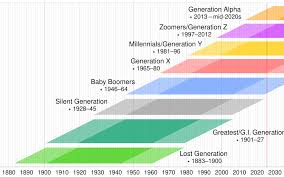
Introduction: The Importance of Understanding Gen Z Years
The years 1997 to 2012 are generally recognized as the Gen Z years, marking the arrival of a new generation that has grown up in an era defined by rapid technological advancement and profound social change. Understanding the experiences, values, and behaviors of Gen Z is crucial as they enter the workforce and influence various sectors, from consumer behavior to social activism. Their unique perspectives are shaping the future in significant ways, making it essential to examine their characteristics and impacts.
The Defining Traits of Gen Z
Members of Gen Z have been exposed to the internet, social networks, and mobile devices from a young age, which has drastically impacted their communication styles and worldviews. A recent study by McKinsey indicates that 55% of Gen Z identifies as socially conscious, with a significant focus on issues such as climate change, equality, and mental health. They are also marked by a heightened sense of individuality and diversity, with a strong inclination towards inclusivity and acceptance of various identities.
Influence on Technology and Communication
In the Gen Z years, digital technology has transitioned from a novelty to a necessity. With platforms like TikTok, Snapchat, and Instagram dominating their social interactions, Gen Z communicates in a manner that often blends creativity with short-form content. According to a survey by Pew Research, around 85% of Gen Z members use platforms that accentuate visual communication. This generation also has a pronounced affinity for digital entrepreneurship, with 72% of them expressing ambitions to start their own businesses.
Social and Political Engagement
Gen Z’s engagement in social and political issues has been unprecedented. The rise of social media platforms has empowered them to mobilize quickly, leading to movements focused on climate action, racial equality, and more. The youth-led climate strikes and protests for social justice highlight their willingness to enact change. A 2023 report from Statista shows that approximately 67% of Gen Z believes in the effectiveness of activism in instigating social change, a significant increase from previous generations.
Conclusion: The Significance of Gen Z Years for the Future
As Gen Z continues to mature, their values and priorities will likely shape industries, politics, and societal norms for years to come. Their distinct experiences during their formative years have rendered them a generation that prioritizes authenticity, diversity, and activism. Businesses and policymakers should consider their perspectives to better connect with this influential group. Understanding the Gen Z years is not just important for demographic analysis; it’s essential for anticipating the future of our society as this generation emerges as the leaders and consumers of tomorrow.



